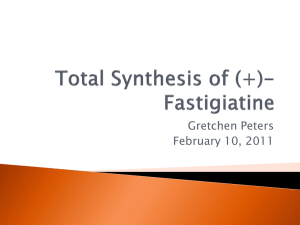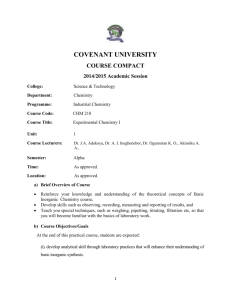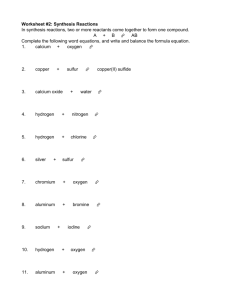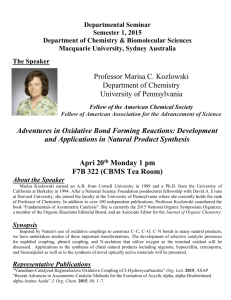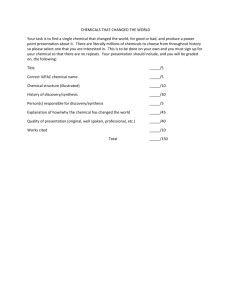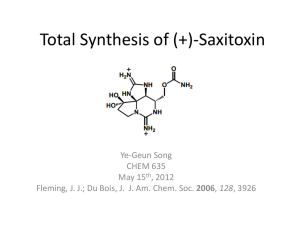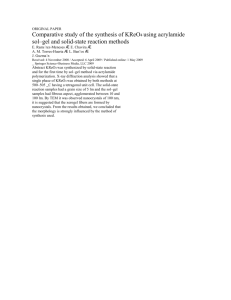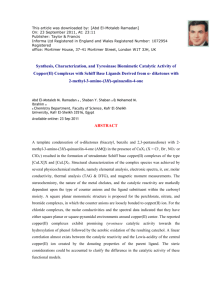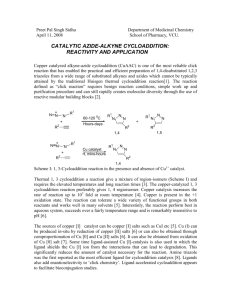1 - Nicholls State University
advertisement
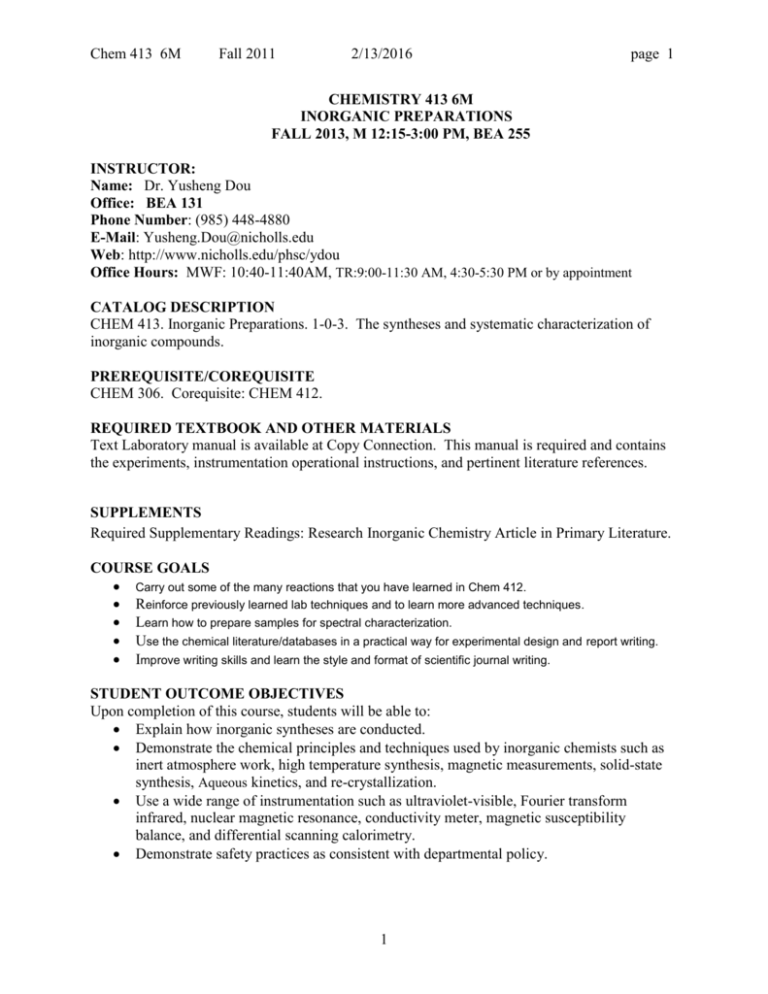
Chem 413 6M Fall 2011 2/13/2016 page 1 CHEMISTRY 413 6M INORGANIC PREPARATIONS FALL 2013, M 12:15-3:00 PM, BEA 255 INSTRUCTOR: Name: Dr. Yusheng Dou Office: BEA 131 Phone Number: (985) 448-4880 E-Mail: Yusheng.Dou@nicholls.edu Web: http://www.nicholls.edu/phsc/ydou Office Hours: MWF: 10:40-11:40AM, TR:9:00-11:30 AM, 4:30-5:30 PM or by appointment CATALOG DESCRIPTION CHEM 413. Inorganic Preparations. 1-0-3. The syntheses and systematic characterization of inorganic compounds. PREREQUISITE/COREQUISITE CHEM 306. Corequisite: CHEM 412. REQUIRED TEXTBOOK AND OTHER MATERIALS Text Laboratory manual is available at Copy Connection. This manual is required and contains the experiments, instrumentation operational instructions, and pertinent literature references. SUPPLEMENTS Required Supplementary Readings: Research Inorganic Chemistry Article in Primary Literature. COURSE GOALS Carry out some of the many reactions that you have learned in Chem 412. Reinforce previously learned lab techniques and to learn more advanced techniques. Learn how to prepare samples for spectral characterization. Use the chemical literature/databases in a practical way for experimental design and report writing. Improve writing skills and learn the style and format of scientific journal writing. STUDENT OUTCOME OBJECTIVES Upon completion of this course, students will be able to: Explain how inorganic syntheses are conducted. Demonstrate the chemical principles and techniques used by inorganic chemists such as inert atmosphere work, high temperature synthesis, magnetic measurements, solid-state synthesis, Aqueous kinetics, and re-crystallization. Use a wide range of instrumentation such as ultraviolet-visible, Fourier transform infrared, nuclear magnetic resonance, conductivity meter, magnetic susceptibility balance, and differential scanning calorimetry. Demonstrate safety practices as consistent with departmental policy. 1 Chem 413 6M Fall 2011 2/13/2016 page 2 TENTATIVE OUTLINE OF COURSE CONTENT The following topics will be addressed in this lab course: Synthesis and Purification of PotassiumTrisoxalatoferrate (III) Trihydrate. Complex Ion Composition of Ni2+-ethylenediamine complexes by Job’s method. Synthesis of [Co(NH3)4CO3]NO3 and [Co(NH3)5Cl]Cl2. Aquation of [Co(NH3)5Cl]2+ Synthesis and Determination of Magnetic Moment of Copper (II) Acetate Monohydrate. Preparation of Copper Glycine Complexes: Cis-Bis(glycinato)copper(II) Monohydrate. Preparation of Copper Glycine Complexes: Trans-Bis(glycinato)copper(II) Solid-State Synthesis of the High-Temperature Superconductor, YBa2Cu3O7-x COURSE REQUIREMENTS See Methods of Evaluation METHODS OF EVALUATION (UNDERGRADUATE) Overall grade will be obtained from the following categories: 1) Lab notebook (includes all experiments conducted) 2) Lab report 1 (Experiment 1) 3) Lab report 2 (Experiment 2) 4) Lab report 3 (Experiment 3A & B) 5) Lab report 4 (Experiment 4A & B) 6) Finial Exam Total Points: 300 points 50 points 50 points 50 points 50 points 50 points 50 points Grading scale - A= 90 - 100%; B= 80 - 89%; C= 65 - 79%; D= 55 - 64%; F= below 54%. ACADEMIC DISHONESTY POLICY Section Five of the Code of Student Conduct, ‘Academic Dishonesty and Disruptive Behavior,’ includes a requirement that faculty file a charge complaint statement with their respective dean whenever a student is confronted or disciplined for cheating. The Office of Academic Affairs will maintain these records, and any student confronted and/or disciplined for multiple offenses of academic dishonesty will be brought before the Academic Affairs Integrity Committee for further review and potential sanctions. Please read the Code of Student Conduct for further details regarding this policy. MAKE-UP There will be NO MAKE-UP labs. ATTENDANCE Attendance of all students is mandatory. A total of two (excused or unexcused) absences will result in the student being dropped from the class with a grade of "F”. DISABILITY STATEMENT If you have a documented disability that requires assistance, you will need to register with the Office of Disability Services for coordination of your academic accommodations. The Office of 2 Chem 413 6M Fall 2011 2/13/2016 page 3 Disability Services is located in 158 Shaver. The phone number is (985) 448-4430 (TDD 4497002). SEMESTER WITHDRAWALS The last day to withdraw form the class with a “W” is November 15, 2013. ACADEMIC GRIEVANCES The proper procedure for filing grade appeals or grievances related to academic matters is listed in Section 5 of the Code of Student Conduct and at the following link: http://www.nicholls.edu/documents/student_life/code_of_conduct.pdf. CONTINUED LEARNING FOLLOWING AN EXTREME EMERGENCY In order to make continued learning possible following an extreme emergency, students are responsible for: reading regular emergency notifications on the NSU website; knowing how to use and access Moodle (or university designated electronic delivery system); being familiar with emergency guidelines; evacuating textbooks and other course materials; knowing their Blackboard (or designated system) student login and password; contacting faculty regarding their intentions for completing the course. Faculty are responsible for: their development in the use of the Moodle (or designated) software; having a plan for continuing their courses using only Blackboard and email; continuing their course in whatever way suits the completion of the course best, and being creative in the continuation of these courses; making adjustments or compensations to a student’s progress in special programs with labs, clinical sequences or the like only in the immediate semester following the emergency. DISCLAIMER This syllabus is not a contract and no part of it should be construed as such. The syllabus is subject to change. Students will be notified of these changes in a timely manner. LAB SCHEDULE The following is a list of laboratory experiments*. Date Day 1 Day 2 Day 3 Techniques Topics Orientation Format of formal post lab report 1. Synthesis and Purification of PotassiumTrisoxalatoferrate (III) Trihydrate Labor Day, No Class Re-crystallization UV-VIS 3 Chem 413 6M Fall 2011 2/13/2016 page 4 UV-VIS Day 6 2. Complex Ion Composition of Ni2+-ethylenediamine complexes by Job’s method 3A. Synthesis of [Co(NH3)4CO3]NO3 and [Co(NH3)5Cl]Cl2 3A. Measurement of conductivity and FTIR Day 7 3B. Aquation of [Co(NH3)5Cl]2+ UV-Vis, kinetics Day 8 Day 13 4A. Synthesis and Determination of Magnetic Moment of FTIR, mag. susceptibility balance, Copper (II) Acetate Monohydrate inert atm 4B. Preparation of Copper Glycine Complexes: DSC, FTIR Cis-Bis(glycinato)copper(II) Monohydrate 4B. Preparation of Copper Glycine Complexes: DSC, FTIR, high temp. Trans-Bis(glycinato)copper(II) 5. Solid-State Synthesis of the High-Temperature solid-state syn., high temp. Superconductor, YBa2Cu3O7-x 5. Solid-State Synthesis of the High-Temperature solid-state syn., high temp. Superconductor, YBa2Cu3O7-x 6. Preparation of Ferrocene inert atm., FTIR, (inert NMR atm., FTIR, NMR) Day 14 Final Exam Day 4 Day 5 Day 9 Day 10 Day 11 Day 12 * All parts of this schedule are subject to revision as events may warrant, and should not be construed as a contract. Students will be notified of any changes. Notifications will appear on http://blackboard.nicholls.edu. Students will be assigned to a partner and a starting group number. Students are responsible for advanced planning for each experiment. Do not try to attempt these experiments without prior thought and reading background material. Little advance planning is not acceptable and will be reflected in your grade. Advance planning includes such things as calculations for solution preparation and the operation/setup of equipment. 4
